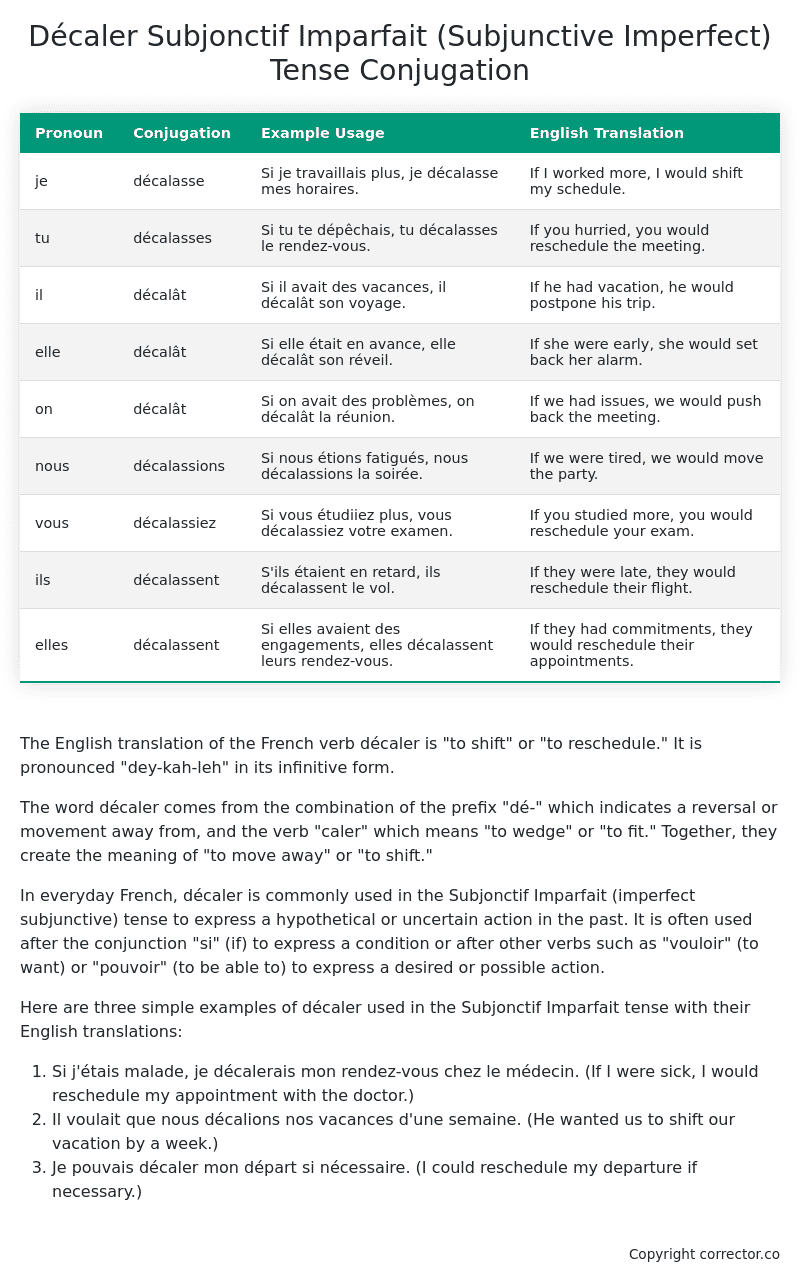Subjonctif Imparfait (Subjunctive Imperfect) Tense Conjugation of the French Verb décaler
Introduction to the verb décaler
The English translation of the French verb décaler is “to shift” or “to reschedule.” It is pronounced “dey-kah-leh” in its infinitive form.
The word décaler comes from the combination of the prefix “dé-” which indicates a reversal or movement away from, and the verb “caler” which means “to wedge” or “to fit.” Together, they create the meaning of “to move away” or “to shift.”
In everyday French, décaler is commonly used in the Subjonctif Imparfait (imperfect subjunctive) tense to express a hypothetical or uncertain action in the past. It is often used after the conjunction “si” (if) to express a condition or after other verbs such as “vouloir” (to want) or “pouvoir” (to be able to) to express a desired or possible action.
Here are three simple examples of décaler used in the Subjonctif Imparfait tense with their English translations:
- Si j’étais malade, je décalerais mon rendez-vous chez le médecin. (If I were sick, I would reschedule my appointment with the doctor.)
- Il voulait que nous décalions nos vacances d’une semaine. (He wanted us to shift our vacation by a week.)
- Je pouvais décaler mon départ si nécessaire. (I could reschedule my departure if necessary.)
Table of the Subjonctif Imparfait (Subjunctive Imperfect) Tense Conjugation of décaler
| Pronoun | Conjugation | Example Usage | English Translation |
|---|---|---|---|
| je | décalasse | Si je travaillais plus, je décalasse mes horaires. | If I worked more, I would shift my schedule. |
| tu | décalasses | Si tu te dépêchais, tu décalasses le rendez-vous. | If you hurried, you would reschedule the meeting. |
| il | décalât | Si il avait des vacances, il décalât son voyage. | If he had vacation, he would postpone his trip. |
| elle | décalât | Si elle était en avance, elle décalât son réveil. | If she were early, she would set back her alarm. |
| on | décalât | Si on avait des problèmes, on décalât la réunion. | If we had issues, we would push back the meeting. |
| nous | décalassions | Si nous étions fatigués, nous décalassions la soirée. | If we were tired, we would move the party. |
| vous | décalassiez | Si vous étudiiez plus, vous décalassiez votre examen. | If you studied more, you would reschedule your exam. |
| ils | décalassent | S’ils étaient en retard, ils décalassent le vol. | If they were late, they would reschedule their flight. |
| elles | décalassent | Si elles avaient des engagements, elles décalassent leurs rendez-vous. | If they had commitments, they would reschedule their appointments. |
Other Conjugations for Décaler.
Le Present (Present Tense) Conjugation of the French Verb décaler
Imparfait (Imperfect) Tense Conjugation of the French Verb décaler
Passé Simple (Simple Past) Tense Conjugation of the French Verb décaler
Passé Composé (Present Perfect) Tense Conjugation of the French Verb décaler
Futur Simple (Simple Future) Tense Conjugation of the French Verb décaler
Futur Proche (Near Future) Tense Conjugation of the French Verb décaler
Plus-que-parfait (Pluperfect) Tense Conjugation of the French Verb décaler
Passé Antérieur (Past Anterior) Tense Conjugation of the French Verb décaler
Futur Antérieur (Future Anterior) Tense Conjugation of the French Verb décaler
Subjonctif Présent (Subjunctive Present) Tense Conjugation of the French Verb décaler
Subjonctif Passé (Subjunctive Past) Tense Conjugation of the French Verb décaler
Subjonctif Imparfait (Subjunctive Imperfect) Tense Conjugation of the French Verb décaler (this article)
Subjonctif Plus-que-parfait (Subjunctive Pluperfect) Tense Conjugation of the French Verb décaler
Conditionnel Présent (Conditional Present) Tense Conjugation of the French Verb décaler
Conditionnel Passé (Conditional Past) Tense Conjugation of the French Verb décaler
L’impératif Présent (Imperative Present) Tense Conjugation of the French Verb décaler
L’infinitif Présent (Infinitive Present) Tense Conjugation of the French Verb décaler
Struggling with French verbs or the language in general? Why not use our free French Grammar Checker – no registration required!
Get a FREE Download Study Sheet of this Conjugation 🔥
Simply right click the image below, click “save image” and get your free reference for the décaler Subjonctif Imparfait tense conjugation!

Décaler – About the French Subjonctif Imparfait (Subjunctive Imperfect) Tense
Formation
Common Everyday Usage Patterns
Interactions with Other Tenses
Subjonctif Présent
Indicatif Passé Composé
Conditional
Conditional Perfect
Summary
I hope you enjoyed this article on the verb décaler. Still in a learning mood? Check out another TOTALLY random French verb conjugation!


